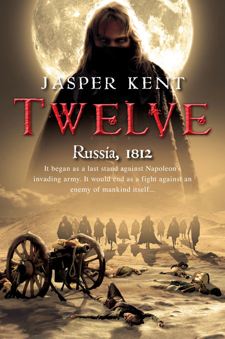Jasper Kent’s Twelve is an engaging, philosophical and exciting book. Before I get more into what I liked about it, I need to talk about the one thing I didn’t like—something, I should add, that isn’t Kent’s fault at all.
On his website, Jasper Kent describes his book as follows: “Twelve is the story of Aleksei Ivanovich Danilov, a captain in the army of Tsar Alexander I, sworn to defend Russia against the onslaught of Napoleon’s Grande Armée in the autumn of 1812. He joins forces with a band of twelve Wallachian mercenaries, whose zeal and success in slaughtering the French invaders seem too good to be true.
“Soon, Aleksei unearths the gruesome secret behind the Wallachians’ abilities, and discovers that they make little distinction between Frenchman or Russian. His fight becomes not simply one against Napoleon, but against a far more dangerous enemy.”
I am quoting the author, here, not out of laziness but to make a point. Or to begin a point, which I’ll make in a moment.
Kent’s description of his novel is concise, interesting and free of spoilers. I would contrast this to the back cover copy, which reveals, not once but twice, a major big huge massive important plot point. Kent himself carefully and gradually develops the plot secret, taking 172 pages to reveal the beans that are spilled on the back cover. The point-I’m-not-spoiling also signals a significant shift in the pace and direction of the story.
As much as I enjoyed Twelve, I sincerely believe I would have enjoyed it more without the spoiler. I’m not sure why the publisher did this. Perhaps they decided they couldn’t market the book without exposing this key element. I disagree, but hey, I don’t work in marketing.
Complaint done. On to the good stuff! I should admit that I am not well versed in the Napoleonic Wars. I cannot, therefore, attest to the historicity of book. I will say that the history felt perfectly believable. Given that I read this for pleasure more than for instruction, I’m satisfied.
The narrator, Aleksei, is a thoughtful character, philosopher and soldier. He’s easy to empathize with, even in some ugly situations. He is cautious, compassionate and loyal. He’s also decisive, at times unforgiving. His musings on life don’t slow down the narrative and the action is purposeful, vivid and violent, as it should be. As evil as his opponents are, good and evil are never entirely opposites for him.
I suppose when writing historical fiction, the author has to choose between a modern voice and a voice emulating the literature of the period. The modern voice is easiest for the reader to understand but can’t feel so modern as to throw the reader out of the setting. The emulative method can feel authentic or forced, depending on the author’s skill. Kent strikes an effective middle ground with a clear and primarily modern voice bolstered by the confidence with which he provides historical details (though to be honest there were a couple of word choices early in the book I wished he hadn’t used, such as “OK” which is so modern as to feel weird in a book about 1812).
He keeps non-English terminology to a workable minimum. I can’t stand it when authors, straining for authenticity, pepper the prose with foreign terms necessitating frequent and awkward explanations and an ungodly number of italicized words. Glad to say Kent doesn’t do that.
Since I’ve complained about the back-cover copy, I can’t very well give any spoilers now, however easier the review would be to write with them. I will simply say that the bad guys mentioned earlier are damn effective bad guys, and make for nasty allies and pretty terrifying enemies.
I didn’t know when I began the book that it was the first in a series (the sequel, Thirteen Years Later, came out in the U.K. earlier this year and will come to the U.S. next February) but I’m very happy to learn that. I’ll definitely keep reading. Twelve is an intelligent, lucid and exciting novel—feel free to put that on the back cover—and is satisfying as a stand-alone story while holding promise for further adventure.
When Jason Henninger isn’t reading, writing, juggling, cooking, or raising evil genii, he works for Living Buddhism magazine in Santa Monica, CA.










